By Chris Aniedobe
Stating dismissively and dispositively that polygamy is Igbo culture exposes gaps in the understanding of Igbo culture. To understand Igbo culture, one has to understand the concepts of Ogu and Ofo which provide the moral underpinnings of Igbo cultural practices.
Ogu is the basket with which Ofo is carried. In other words, ogu is the due process that gives weight and content to our choices in action that make them both morally right and just.
One cannot strip polygamy of ogu and ofo and call it Igbo culture. Mbanu. Omenala nwere usoro. (Culture has its procedures) Usoro is procedural cultural practices that make their substantive outcome just and fair.
In polygamy as practiced in the olden days, there were two parties to a marriage contract, namely a man and a woman. The man makes the proposal, and the woman accepts, and families bear witness that both have agreed to cohabit. No oaths are taken but the expectation is that both parties should work for each other’s happiness. In other words, traditionally, the man does not forswear having other mates and the woman understands that her husband can have other mates. That is polygamy for you, and it is fair. There was an offer, both parties had a meeting of the mind, followed by acceptance, and witnessed by the respective families.
But now, here comes modern marriage contracts, a game changer, involving a third party and recital of oaths and covenants between the parties and the third party. The ogu in this case is decidedly different from the ogu of traditional Igbo marriages because of the third party.
In Igbo culture, a person who takes an oath before a deity wilfully and voluntarily submits to the wrath of that deity should he contravenes the oaths and covenants. Oath taking before deities is a serious undertaking and punishment for contravention can be swift and severe.
Pay attention to the differences in ogu. In traditional marriages, there is exchange of promises between a man and a woman. In non-traditional marriages, there is a third party, deity, who now has powers to enforce the oaths.
Many Igbos do not understand the omenala (tradition) behind the so called church wedding but the ones who have wedded traditionally and then go on to make further marriage oaths and covenants before a deity have indeed bound themselves by solemn submission to the wrath of that deity should they act contrary to their oath.
In other words, people cannot simply and voluntarily swear an oath of marital fidelity and faithfulness before the supreme deity called Chukwu and then turn around and break it willy-nilly and still claim that they are doing what is culturally allowed.
Mbakwa (no). The oaths stay with you and breaking them has consequences.
So, if you have had church wedding and sworn before God and man that you would be faithful to your wife, Igbo culture forbids you from taking a second wife without first securing a release from the oath you took. You can get a release from your oath if the Ezemuo (chief priest) of that deity secures such release on grounds and reasons acceptable to that deity.
Omenala Igbo and Judaism have ample support for all I have written. Make your vows to the Lord and perform them for he is terrible to those who fail to do so. Psalm 76 v 11. So let no one voluntarily go before a deity and swear an oath of monogamy and then willy-nilly breaks it, marries a second wife and claims that it is Igbo culture. A blacksmith who does not know how to make a gong is advised to study the tail of a kite. If you want to know Igbo culture, read your Bible.
Don’t fool yourself by observing that David, Solomon, and many married multiple wives. The point is that they never went before Yahweh and swore that they would marry only one wife. If they had sworn, they know enough omenala to appreciate that the consequences can be terrible.
Dr. Chris Aniedobe, a Lawyer and social activist is based in the U.S.

